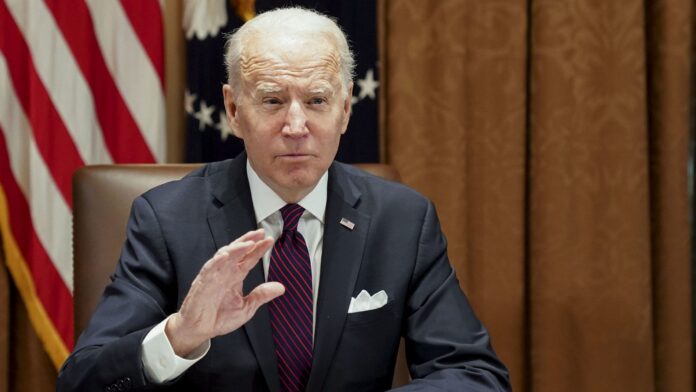The Taliban’s takeover of Afghanistan in August 2021 prompted governments and international institutions to quickly freeze Afghan Central Bank assets abroad. Reportedly, about $7.1 bn of Afghan assets was held in the US. On February 11, 2022, the White House issued an Executive Order that creates the possibility of dividing Afghanistan’s frozen assets between 9/11 victims and humanitarian aid to Afghans.
By Dr Anwesha Ghosh
The Biden administration stated that it would ask a judge for permission to move $3.5 billion to a trust fund it would set up to support the needs of the Afghan people facing acute humanitarian crisis. The same order also stated that President Biden is beginning to clear a legal path for the relatives of victims of the 9/11 attacks to get $3.5 billion from Afghanistan’s assets that country’s central bank had deposited in New York before the Taliban seized power; as they are entitled to the money following previous default ruling against the Taliban and other groups named in earlier lawsuits. According to the order, even if the pending judgement allows $3.5bn to go to the people of Afghanistan, another $3.5bn would stay in the US and remain “subject to ongoing litigation by US victims of terrorism”.
Meanwhile, the situation in Afghanistan is more alarming than ever before because the country now faces severe, multi-faceted, and interlocking humanitarian, economic, and political crises, all at the same time. War, conflict, chronic poverty, drought, widespread food insecurity have had a protracted presence in Afghanistan, perhaps COVID-19 pandemic was a fresh addition to the already long list of destabilizing factors in the country. All these issued have contributed to the humanitarian disaster the country faces now. Yet, the political turmoil caused due to the Taliban takeover of Afghanistan on August 15, 2021, played an important role in accentuating the humanitarian and financial crises in the country.
According to reports, some US$ 150 billion in non-military US aid flowed into Afghanistan between 2001 and 2020, plus billions more from international organizations. Nearly 80 percent of the budget of the Afghan Republic, which not only funded government ministries but also public services like healthcare, education, governance expenditure and infrastructure; came from the international community. In order to prohibit the Taliban regime from accessing those funds, in August 2021 more than $9.5 billion of Afghanistan’s assets were frozen. Almost all sources of Afghanistan’s aid, including the European Union, the International Monetary Fund and other multilateral organizations, stopped disbursing assistance to Afghanistan which had a significant impact on the economy of the aid dependent country.
The World Health Organization had predicted, around 3.2 million children are expected to suffer from acute malnutrition in Afghanistan. An estimated 22.8 million people, or 55 percent of the population, are expected to face emergency levels of food insecurity between November 2021 and March 2022. The United Nations has repeatedly warned that Afghanistan is on the brink of the world’s worst humanitarian crisis with more than half the country facing “acute” food shortages. Jobs and liquidity have dried up in the country and many government servants’ salaries have not been paid for months. According to a recent survey by an International NGO, more than 80 percent of those surveyed reported a loss of income since the fall of West backed government, with slightly more than a third having lost all of their household income.
Over the past few months, the new rulers of Afghanistan have realized that governing a country with empty coffers will be extremely difficult and therefore have consistently appealed to the US administration to unfreeze the funds. The release of the frozen assets would have given major relief to the current regime but the Biden administration was not willing to budge to the Taliban demands, as that was the only leverage the international community was left with to force the Taliban to respect human rights and especially rights of women in the country. US’s recent decision to finally release frozen assets must have been an important step for the Taliban, but Washington’s twist to split the total fund and retaining half of it for 9/11 victim families has generated strong response within Afghanistan.
Response to Biden’s decision
The Taliban has called on the US President to reverse the move of the fractionalized flow of Afghan funds and has urged to reconsider the policy. The Taliban has branded the seizure of Afghan funds as “theft” and a signal of “US moral decay”. They have rejected Biden’s action, calling it violation of the rights of Afghans. The Taliban has issued a warnings stating if the US does not deviate from its position and continues its proactive actions, “the Islamic Emirate will also be forced to reconsider its policies towards the country.” They also added that the 9/11 attacks had nothing to do with Afghans. It is important to note while none of the attackers of September 11, 2001 were from Afghanistan, the mastermind of the attacks, Al Qaeda chief Osama bin Laden was given refuge by the Taliban government.
Former President Hamid Karzai has also urged the Biden administration to rescind the decision. He said the money belonged to the Afghan people and that it was “wrong” to use it for other purposes- “We commiserate with American people [but] Afghan people are as much victims as those families who lost their lives. Withholding money or seizing money from the people of Afghanistan in their name is unjust and unfair and an atrocity against Afghan people.” He requested President Biden to return the totality of Afghan assets to the people of Afghanistan. Biden’s decision has also not gone down well with Afghan activists like Freshta Karim, children’s rights activist and advisor to Malala Fund, who said “the money belongs to the Afghan people, not the Taliban nor the U.S. government. It should not be confiscated and used without their consent. This Executive Order does not represent justice for Afghanistan but punishes its people for the actions of others.”
To conclude, it can be said that the answer to the question- who should control Afghanistan’s foreign cash reserves was never meant to a simple one; especially under the present circumstances. While the intention to keep the cash out of the Taliban hands can be understandable, yet the key question that remains is whether this is the right approach for achieving that objective?
This article first appeared in www.vifindia.org and it belongs to them.








